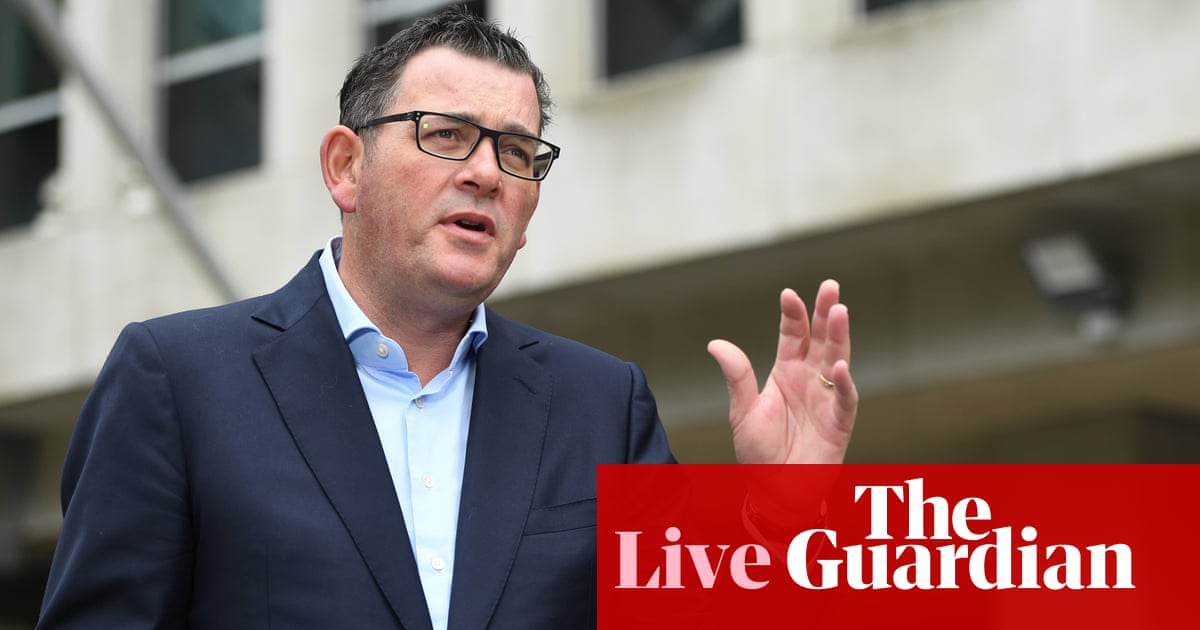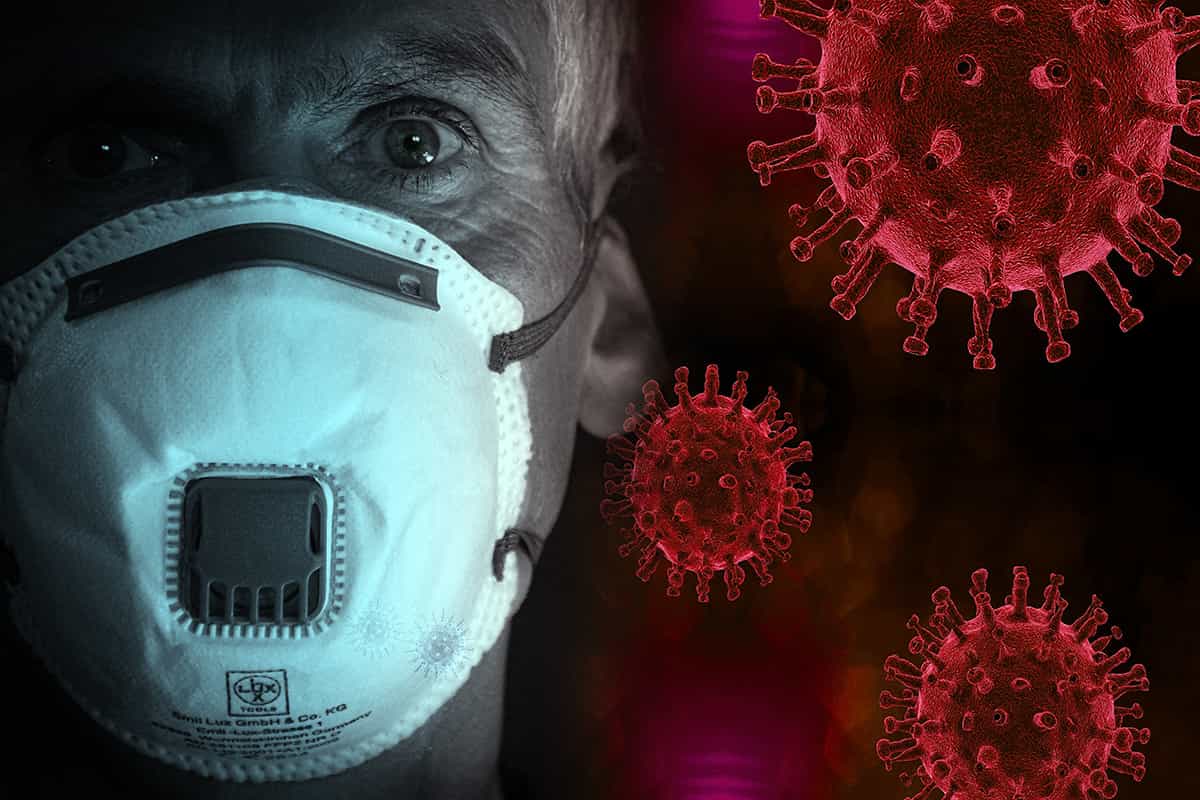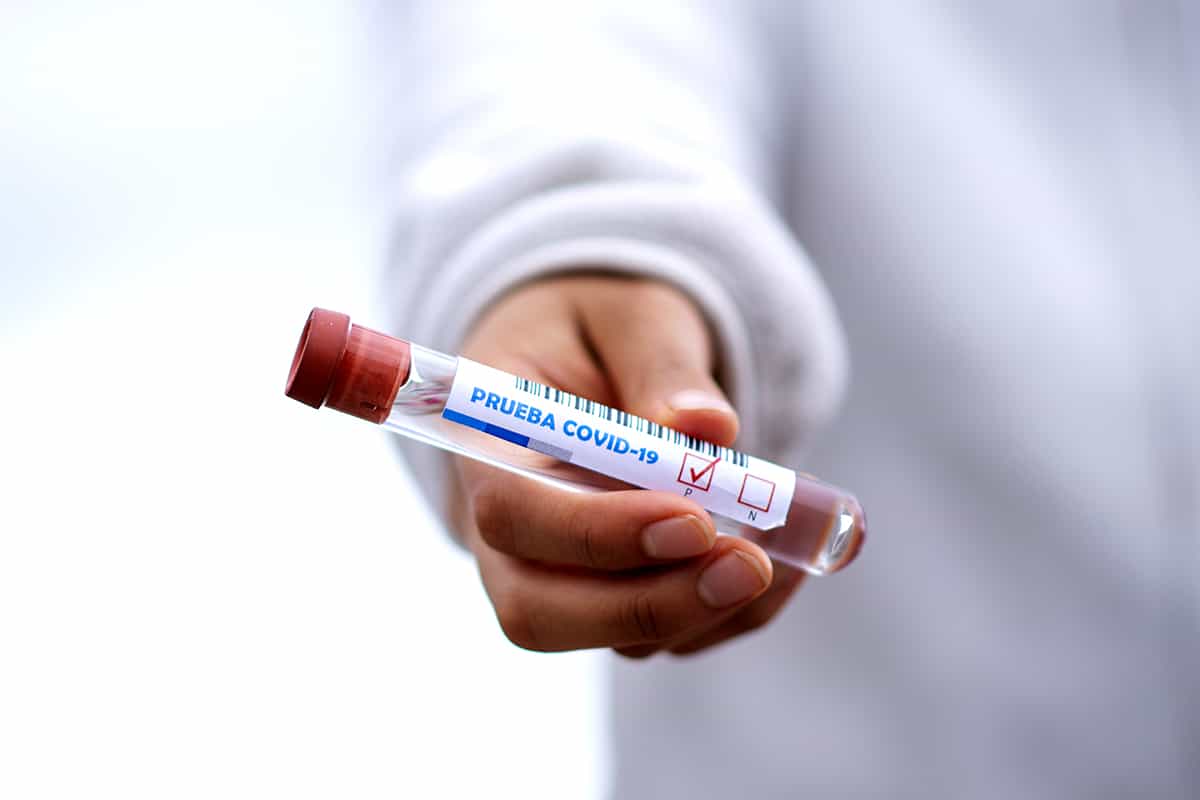In New South Wales shadow health minister Chris Bowen and shadow home affairs minister Kristina Keneally have held a press conference, with Bowen calling for more testing to be carried out across Australia. Countries have been grappling with a worldwide shortage of the swabs. Bowen says:
I understand the constraints and limitations on testing but we need to do more. Today we say it must be the formal objective of government policy to have people tested if they are in contact with people who have suffered Covid-19 or have symptoms. People across the country are exhibiting symptoms, worryingly going for test and being denied because they do not meet criteria.
You can read more about Australia’s criteria for testing here, and on Friday the government announced all aged care workers could be tested as well regardless of close contact with a case.
Meanwhile Keneally said people in self isolation who cannot access home delivery groceries are being directed to food bank, which she described as inappropriate.
And that is an unacceptable way to address this gap. People who can shop at grocery stores should not be directed to food banks. Food bank is there for the most vulnerable in the community. It is a charity, it is a charity that is there to supply people who are most in need, with food. And the demands on food banks are extraordinary at this time. I spoke with senior officers at a food bank in the last 24-hours who told me that not only are there stocks running low but their supply of volunteers is drying up. This is not an appropriate response.
A lot to take in from that press conference in Victoria with the premier Daniel Andrews and treasurer Tim Pallas. In summary:
- There are 51 new cases in Victoria taking cases in the state to 229.
- An economic survival package was announced for the state’s businesses including payroll tax refunds and commercial renting relief, plus support for hospitality and tourism
- Crown casino is no longer exempt from social-distancing rules
And finally, on school closures, the premier had this to say:
It remains the advice of both the chief health officer and every other health officer across the country, and the chief medical officer Brendan Murphy, that schools should remain open. That is the health advice. Again, I am in no way criticising parents for being concerned. Being anxious, that is a perfectly natural thing. I again make the point, the consistent and unanimous advice of chief health officers, the experts, is that schools should remain open. We have a week to go until we get to school holidays. I want to take this opportunity to thank you, to thank both as the premier and on behalf of my family, every teacher, every worker in our schools, they are doing a fantastic job. My kids are at school, the chief health officer’s kids are at school, that is the medical advice, that is the advice of experts, that could change.
If it does, you will be the first to know.
Crown exemption from coronavirus social distancing rules revoked

Ben Butler
It is unclear whether the revocation of its exemption from coronavirus rules means Melbourne’s Crown casino will have to shut its doors today for the first time since it was forced to close for a few days during anti-World Economic Forum protests in 2000.
The casino has been allowed to keep half of its poker machines operating under an exemption from social distancing rules granted by the Victorian chief health officer – a decision that enraged public health officials. Victorian chief health officer Brett Sutton may provide more information when he faces the media later today.
Closure would be a devastating blow to employment in Melbourne – the group employs at least 6000 people at the casino, and some 18,500 people in total.
Victoria’s decision also puts pressure on the governments of Western Australia, where Crown also has a casino, and New South Wales, where rival Star operates, to follow suit.
Crown shares have been in a trading halt since lunchtime on Friday, when the company said it was in “discussions” with Sutton over its trading conditions.
But this was before prime minister Scott Morrison dramatically beefed up social distancing rules in the afternoon by limiting the number of people inside a venue to one every 4sq m.
Crown has been contacted for comment.
Reporters have asked the Victorian premier, Daniel Andrews, to comment on scenes from New South Wales of people congregating at beaches despite social-isolation messages.
He responds that while from “time to time” he has “fallen to giving Sydney a hard time,” he would refrain from doing so on this occasion. He says:
Everyone plays their part, and that is not what was occurring on beaches yesterday and in probably lots of other locations in our state and other parts of the country. It is not about one state versus the other. It is one example of people perhaps not taking this as seriously as they should.
If you are in any doubt how serious this is, turn your TV on and have a look at what is going on in other parts of the world. People are dying, we are going to get to a very, very bad place when it comes to public health in the weeks and months ahead. It is going to be very challenging. There is no getting around that. But each of us can make that a little easier if we do the right thing now and we keep doing the right thing as our civic duty to ourselves, our families and every single Victorian.
Back to Victorian premier Daniel Andrews:
This is not a tax cut… this is a refund, money back to businesses that has been paid. It is sitting in the government’s bank account, I’m going to put it in businesses bank accounts so they can have that extra support to make it more likely that they can support their staff and that in turn their staff can support their families.
At the press conference this morning announcing Victoria’s economic package detailed below, the state’s treasurer Tim Pallas said it was “the biggest business support package in the history of this state”.
And it has to be, because we are facing t a public health crisis and a business crisis. What we hear from business, we have had many discussions with business leaders over the last couple of weeks, they have told us, particularly small businesses, the problem is around cash flow. What this package is very much aims to do is to make sure we get cash into businesses pockets as quickly as possible.
This cash… will go to those 24,000 businesses that employ about 400,000 workers. And they are really at the front end of the economic crisis that is of course a manifestation of the public health crisis that we are attempting to deal with. In real terms this is the biggest support package of any of the states.
Victoria economic package announced for businesses
This morning the Victorian government has announced what it described as a $1.7 billion “economic survival and jobs package”, which has been developed following discussions at national cabinet.
The state government will provide full payroll tax refunds for the 2019-20 financial year to small and medium-sized businesses with payroll of less than $3m. Payments will start being made next week and will save eligible business up to $113,975 a year, with businesses saving an average of $23,000. These businesses employ around 400,000 workers. In a statement the Victorian government said:
This assistance is a refund, not a loan. The same businesses will also be able to defer any payroll tax for the first three months of the 2020/21 financial year until 1 January 2021, freeing up a further $83 million in cashflow.
Commercial tenants in government buildings can apply for rent relief and 2020 land tax payments will be deferred for eligible small businesses. The government will also pay all outstanding supplier invoices within five business days – releasing up to $750m. The private sector is being urged to do the same where possible.
The government will also waive liquor licensing fees for 2020 for affected venues and small businesses. A $500m Business Support Fund has also been established for hospitality, tourism, accommodation, arts and entertainment, and retail.
The government will work with the Victorian Chamber, Australian Hotels Association and Ai Group to administer the fun.
Meanwhile a $500m Working for Victoria Fund will be established in consultation with the Victorian Council of Social Services and Victorian Trades Hall Council. The fund will help workers who have lost their jobs find new opportunities, including work cleaning public infrastructure or delivering food.
In Victoria the premier Daniel Andrews has announced “a refund back in the accounts of businesses in just a few days time, cash that will be critical to them being able to support their workers and in turn those workers being able to support their families”.
He announced a package of three parts including $500m in payroll tax refunds for businesses. Eligible businesses will receive payroll tax for the year to date back, and the final three months of this financial year will be waived.
So there will essentially be for those businesses, 24,000 of them, no payroll tax paid this year. That is, businesses up to a payroll of $3m.
Updated
Be strong, be kind, NZ prime minister urges

Eleanor Ainge Roy
Prime minister Jacinda Ardern has asked New Zealanders to restrict their movements around the country, and cancel all non-essential domestic travel.
Ardern also asked those aged 70 and over, or with a compromised immune system to stay home for the foreseeable future.
Those who could work from home should now do so, Ardern said, but reassured Kiwis that essential services such as supermarkets and pharmacies would remain open. There are four alert levels in New Zealand, and the country was currently at stage two.
Ardern took a warm and smiley demeanour for her address, in a bid to reassure New Zealanders in “unprecedented times”. Fourteen new cases of the virus were confirmed today, bringing the total number of cases to 53. Two of the cases show no link to overseas travel, meaning community transmission may now be under way.
“Protecting New Zealanders from the virus is our number one objective, and we must take decisive action to prevent the worst occurring here,” Ardern said.
“New Zealand is fighting an unprecedented global pandemic. We must fight by going hard and going early with new measures to slow the transmission of the virus.”
“These measures are being taken in the national interest. We know people, business, and sports events will be impacted, but these are short-term disruptions for the overall health of our people and country.
“I know many New Zealanders are anxious. The alert system is designed to offer certainty around future action and the ability for people to plan and prepare for any future eventuality. Please be strong, be kind, and unite against COVID-19,” Ardern said.
RNZ
(@radionz)#BREAKING Prime Minister Jacinda Ardern has announced an alert system to manage the Covid-19 outbreak. https://t.co/UiCjKpenyk
March 20, 2020
Updated
About 2,700 passengers who disembarked a cruise ship in Sydney have been told to self-isolate after three people who were onboard tested positive for Covid-19. Reporter Luke Henriques-Gomes writes:
“Confirming the news on Friday, the NSW health minister, Brad Hazzard, said the doctor onboard had conducted 13 tests on the Ruby Princess, which had completed a relatively short cruise around the Pacific to New Zealand.
Two passengers who have tested positive are being treated in a Sydney hospital and another who may have contracted the virus made it to Tasmania and is in hospital there. A crew member who tested positive remains on the ship, which is docked off the Australian east coast.
Guidelines introduced by the government this week mean people who had arrived from overseas were already required to self-isolate for 14 days. But Hazzard said authorities were now concerned that others may also have contracted the virus and that passengers were unaware there were confirmed cases onboard.”
Last Sunday the Australian government banned international cruise ship arrivals for 30 days. Questions are now being asked about why tighter quarantine and screening controls weren’t implemented before passengers disembarked. One passenger in serious condition in hospital. The state’s chief medical officer, Kerry Chant, said on Friday passengers on the ship were considered “low-risk” since it had travelled between Sydney and New Zealand.
Updated
Dr Gaetan Burgio from the John Curtin School of Medical research at the Australian National University said over 100 human clinical trials are underway against Covid-19. He says:
It is possible that some drugs could possibly ‘cure’ coronavirus but it is too early to tell. We at least know which ones don’t ‘cure’ coronavirus such as anti HIV drugs. Incoming weeks will give us a better idea of which drugs will be suitable to treat or cure the infection.”
Meanwhile, Associate Professor Adam Kamradt-Scott, an expert in the spread and control of infectious diseases at the Centre for International Security Studies at the University of Sydney, has addressed the question of why the mortality rate is apparently higher in Europe than in China. The short answer is that we don’t know just at the moment, he says.
What we do know is that there are multiple factors that can influence disease transmission, ranging from geographical considerations and population density to factors such as the extent of intergenerational families living in the same households, a history of being a smoker, etc. It is for this reason that we need to be very careful in extrapolating what we see happening in one country to apply it to our own. Australia’s outbreak of Covid-19 has already been very different from what many other countries have experienced, and that will likely continue to be the case.”
Julie Leask
(@JulieLeask)If confused by so much advice and information, a good place to start is the COVID-19 public health advice from your state or territory government. Mine – @NSWHealth has extensive FAQs. https://t.co/1z6JinGymh
March 20, 2020
Professor Julie Leask, from the University of Sydney and whose research focuses on infectious disease, has addressed the question of how the public should respond to the proliferation of data, graphs and information on the virus on social media. How can people tell what is accurate? She says:
Government should give journalists and the public better access to evidence informing their decision making. This could occur with more detailed information about what is underpinning key decisions. Health departments are working hard to provide a great deal of information, so it is not about volume as much as about the kind of information being provided and its relevance.
People are clearly crying out for detailed rationales. This is more important than ever as we are at a crucial stage of people starting to shape their views on how this should be managed. Putting the current evidence into that picture will help bring people along. It has been encouraging to see a little more transparency in the last few days. The AHPPC’s online update became much more detailed.
Social media gives many a voice. This is a two-edged sword because it democratises access to evidence but also brings confusion with so many apparently expert voices. We all need a bit of humility in recognising that the knowledge about COVID-19 is still emerging and what we think is right now may not be right next week. In any case this will change as government ramps-up the physical distancing measures.”
Thanks to the Australian Science Media Centre for compiling these responses.
Au Science Media Ctr
(@AusSMC)#Coronavirus – Answers to your latest questions on #TestingForCovid19 from @Swinburne @UNSW @QUThttps://t.co/cIuQ3RmNF7 pic.twitter.com/IFXxUaCaNX
March 20, 2020
The Australian Medical Association’s South Australia president, Dr Chris Moy, is speaking to ABC News. There has been so much debate as to whether Australia is doing enough to prevent virus spread, with people calling for total lockdowns of all schools, workplaces and venues. On Friday, the prime minister flagged that certain areas of the country that are current hotspots for the virus may be locked down, though those suburbs have not been announced yet. However, Moy said he believes Australia is preparing well, telling the ABC:
I think we have done well in Australia, even compared to other countries. You may not feel that sometimes, because everyone is a little bit of frazzled and doctors are human too. You’re sometimes getting different messages from doctors.
I think we’re going to have to deal with a society that’s having to come to terms with the fact there’s big changes… there’s a slight mismatch of resources versus need. What I say to you, if the community can hang with us, all the doctors out there, all the nurses out there, trying to do our best, we’re in a [good] position.
And I hope very much we see a united front from doctors and nurses in confronting what is about to happen.
He said while questions had been asked about whether enough tests were being carried out as the world faces a shortage of swabs, Australia was still carrying out more widespread testing than many other countries.
Testing is one half of the equation and the community needs to do its part, including social distancing and good hygiene. That’s what has broken the back of this in the countries that have succeeded in controlling Covid-19.
Correction: this post previously incorrectly quoted Moy as saying South Australia has carried out more tests than the US. Australia as a whole has carried out more tests to date than the US.
Updated
We have been duped. While lock-downs around the world have seen reports of cleaner water and air, and a return of birdlife and fish, some people have taken those reports to the extreme, with fake reports of elephants and dolphins returning spreading on social media. Natasha Daly has written this excellent report for National Geographic about what’s true and what’s not.
Dolphins and fish: nature moves into spaces left empty by Italian coronavirus quarantine – video
Updated








